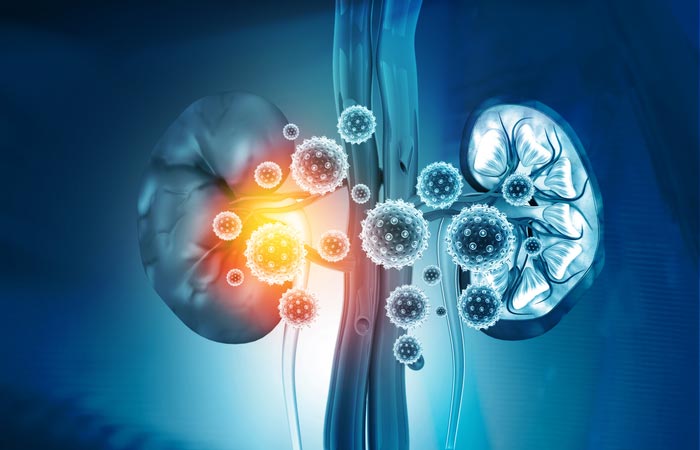COVID kidney injury twice as common as diagnosed

Artist's impression of inflamed and damaged kidneys.
Credit: The University of Queensland
A University of Queensland-led study has found millions of COVID-19 patients may have undiagnosed acute kidney injury (AKI).
AKI is a condition where the kidneys suddenly fail to filter waste from the blood, which can lead to serious illness or even death.
Existing data indicates approximately 20 per cent of patients admitted to hospital with COVID-19 develop AKI, rising to roughly 40 per cent for those in intensive care.
But UQ PhD candidate and kidney specialist Dr Marina Wainstein said the true numbers could be double those figures.
“Doctors look at the amount of urine a patient passes and the level of a compound called creatinine in the blood, which rises when the kidneys aren’t working well,” she said.
“However, if that creatinine rise occurs before a patient presents to hospital, we can miss the AKI diagnosis and fail to manage the patient appropriately in those early, critical days of hospitalisation.”
Dr Wainstein said when researchers also measured the fall in creatinine levels, which often follows the initial rise, the rate of AKI diagnosis in COVID-19 patients doubled.
“That was a pretty shocking finding,” she said.
Dr Wainstein said ‘missing’ AKI in COVID-19 patients is dangerous.
“Even though the AKI is already starting to improve in hospital, our research shows that these patients have worse in-hospital outcomes and are more likely to die compared to patients with no AKI,” she said.
Dr Wainstein said treatment for AKI can be as simple as checking a patient’s hydration level and stopping medications that can be toxic to the kidneys.
Study supervisor Dr Sally Shrapnel, from UQ’s School of Mathematics and Physics, said collecting and analysing data for the project during the pandemic proved challenging.
“Typically data scientists work with complete, well curated registry data, but in this project it was collected by hospital staff working under extremely onerous conditions in a variety of different resource settings,” she said.
“Curating and cleaning the data turned out to be a significant part of the project.”
Dr Shrapnel said the researchers were able to include data from resource-poor countries, where community-acquired AKI is also more common.
“These people have limited access to healthcare and are more likely to present late in the disease process.”
Dr Shrapnel said a more comprehensive definition of AKI – one which can detect cases that develop in the community – needs to be implemented as soon as possible.
“Now we have the data showing a large gap in AKI diagnosis exists, it’s time to test this definition in a clinical trial so we can identify all AKI patients early and hopefully prevent these awful outcomes.”
The research is published in PLOS Medicine.
Journal: PLoS Medicine
DOI: 10.1371/journal.pmed.1003969
Method of Research: Observational study
Subject of Research: People
Article Title: Use of an extended KDIGO definition to diagnose acute kidney injury in patients with COVID-19: A multinational study using the ISARIC–WHO clinical characterisation protocol
All latest news from the category: Health and Medicine
This subject area encompasses research and studies in the field of human medicine.
Among the wide-ranging list of topics covered here are anesthesiology, anatomy, surgery, human genetics, hygiene and environmental medicine, internal medicine, neurology, pharmacology, physiology, urology and dental medicine.
Newest articles

Superradiant atoms could push the boundaries of how precisely time can be measured
Superradiant atoms can help us measure time more precisely than ever. In a new study, researchers from the University of Copenhagen present a new method for measuring the time interval,…

Ion thermoelectric conversion devices for near room temperature
The electrode sheet of the thermoelectric device consists of ionic hydrogel, which is sandwiched between the electrodes to form, and the Prussian blue on the electrode undergoes a redox reaction…

Zap Energy achieves 37-million-degree temperatures in a compact device
New publication reports record electron temperatures for a small-scale, sheared-flow-stabilized Z-pinch fusion device. In the nine decades since humans first produced fusion reactions, only a few fusion technologies have demonstrated…





















